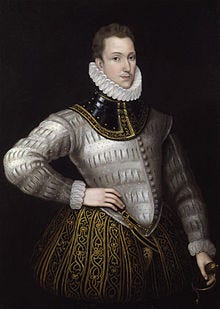My Substack title comes from Sir Philip Sidney’s The Defence of Poesie (1582) where he finishes by imploring the reader “I conjure you all that have had the evill lucke to reade this inke-wasting toy of mine, even in the name of the nine Muses, no more to scorne the sacred mysteries of Poesie, no more to laugh at the name of Poets…”
Sometimes called The Apology for Poetry, this short essay is one of the first (and finest) pieces of literary criticism in English and it beautifully combines a self-deprecating, whimsical tone with an incisive unpacking of what poetry is and what it’s for. Near the opening of the piece, Sidney describes his reason for writing: “having slipt into the title of a Poet, [I] am provoked to say somthing unto you in the defence of that my unelected vocation”. Given that Sidney wrote over a hundred poems in his sonnet sequence Astrophil and Stella alone, “slipt into” and “unelected” might seem false humility, but Sidney was also a courtier, a soldier, and a diplomat — poetry for him was a pretty much a side-hustle. Katherine Duncan-Jones (Sidney scholar and biographer) suggests that Sidney regarded his writing as “toys”, juvenilia, an apprenticeship to the bigger work of writing an epic which he never had the chance to embark on. However, after his untimely death at the age of 32, his poetry and his prose romance Arcadia were printed and his reputation as one of the foremost Elizabethan writers firmly established by his contemporaries. Poetry was indeed Sidney’s vocation, whether he chose it or not.
The double helix move of Sidney’s conclusion to The Defence, both undercutting himself and his work while extolling the heights of poetry, is brilliant and funny and it sums up some of my feelings about writing in this lovely and slippery artform. Poetry as a creative endeavour seems to me one of the most important things I could possibly do while the world crumbles around me and simultaneously an enormous waste of time and effort. Given that poetry is all about Keats “negative capability” maybe both these things can be true. In dark times, poetry is not only something to turn to but a way of thinking, of seeing. Poetry can give voice and shape to things otherwise only sensed or imagined. And, failing all that, fooling around with words is also a lot fun.
So join me while I waste some digital ink on Substack.





Ruth- I do like poetry as a way of seeing. Art forms as a whole do have that going for them, indeed. Thanks for sharing